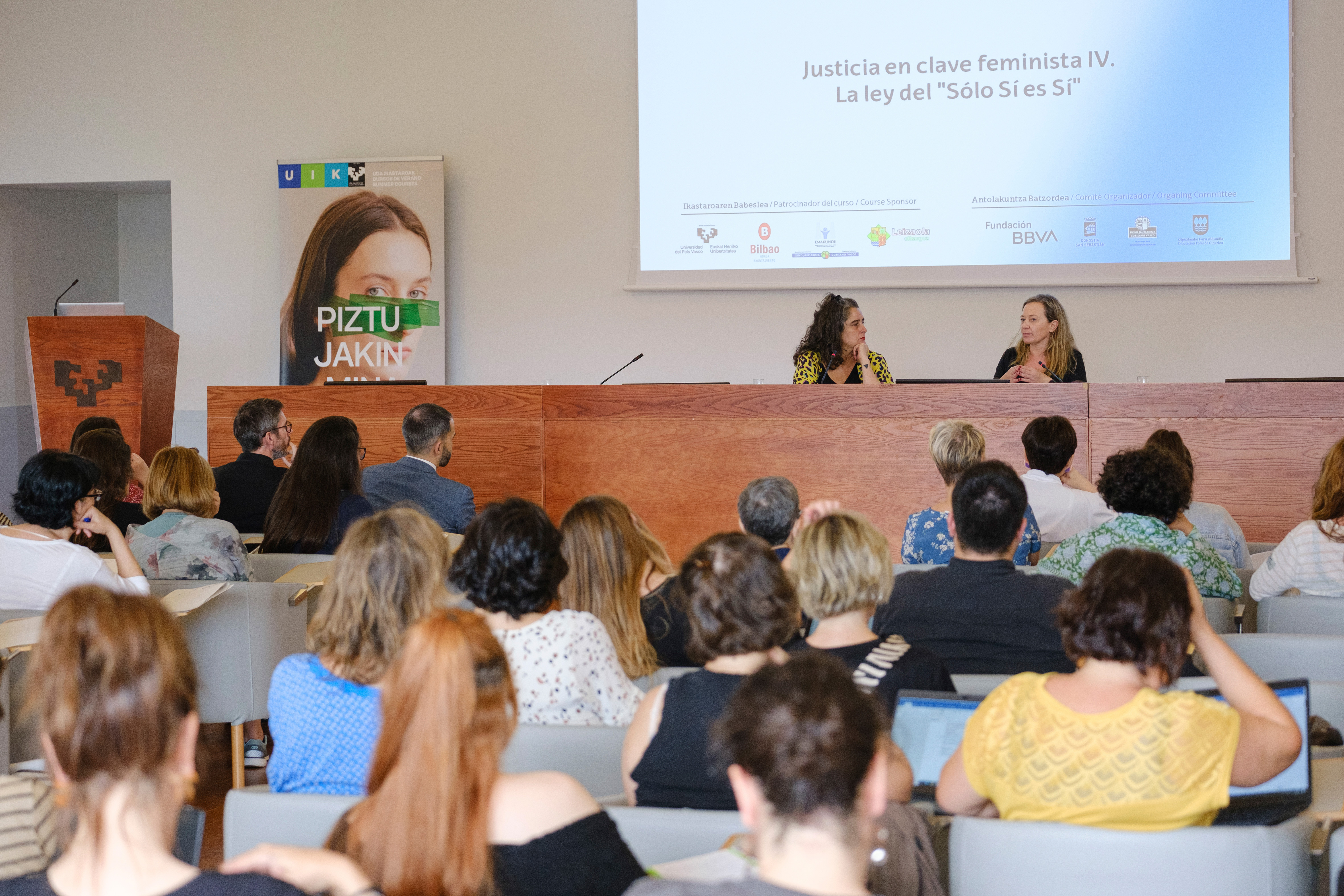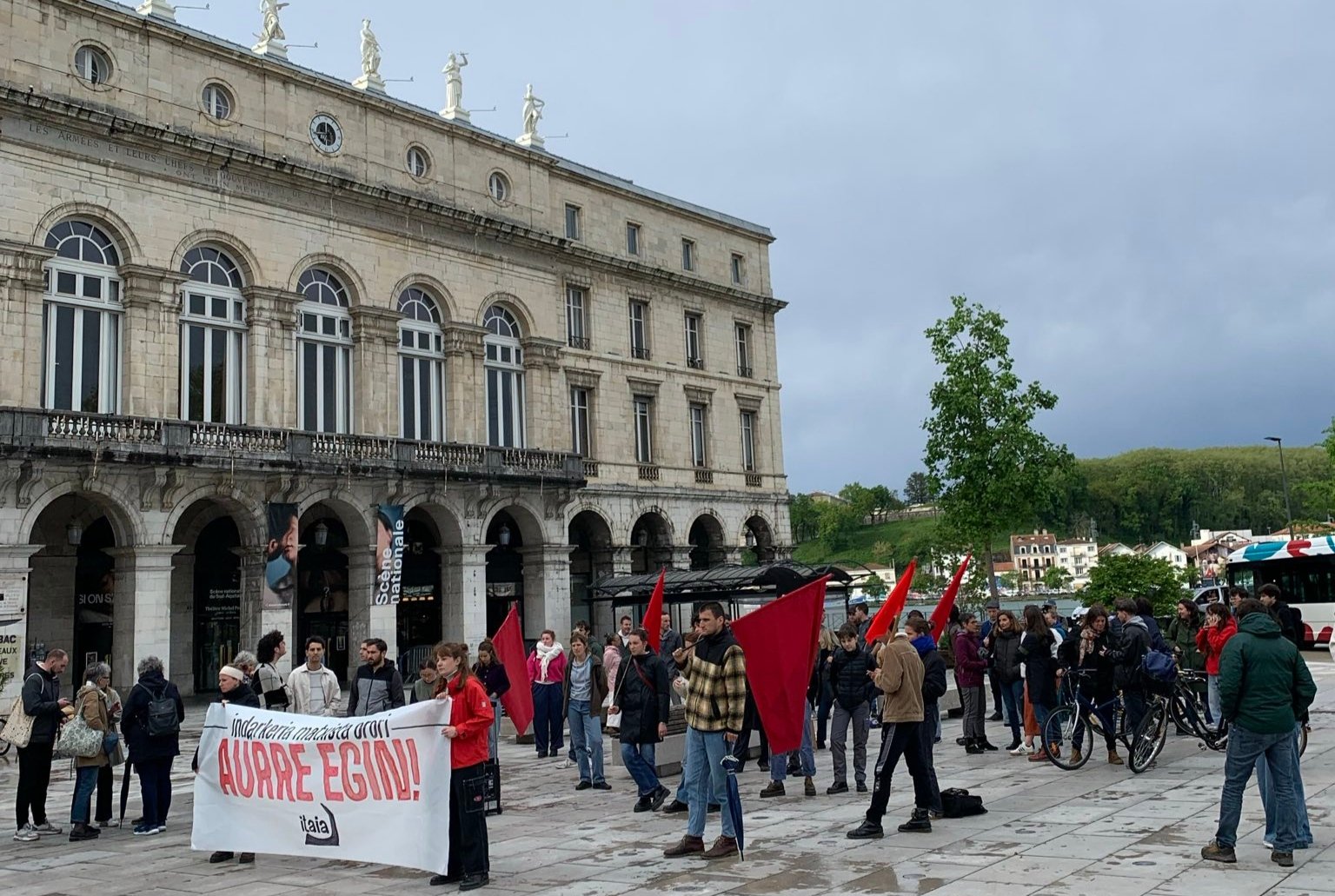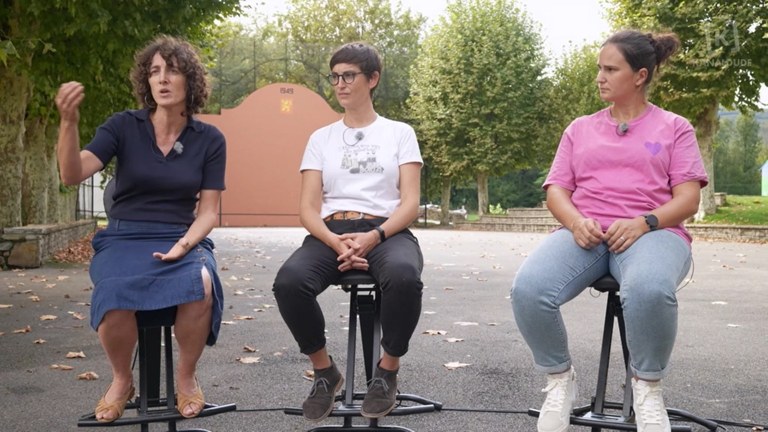Beyond the controversy, points to know
- Since last November, especially in the media, much has been said about the Spanish Organic Law for the Full Guarantee of Sexual Freedom. The law, known as “only yes”, has generated significant media noise, largely due to political noise. But clarifying information has been replaced by false beliefs and false messages. That is what at least the organizers of the Feminist Justice Line at the UPV Summer Courses say. They have taken advantage of it to get away from noise and misinformation and to make a deeper reflection, led by jurists, journalists and feminists who have worked closely with the law.

On 26 and 27 June, the lights and shadows on the "Only Yes" law were elaborated at the Bizkaia Aretoa in Bilbao and focused on the media treatment given to it, as it was fundamental for the construction of a widespread illegal discourse in society, according to the course's speakers. The foundation of the law has been the idea of consent, and crimes of sexual assault and sexual abuse have come together in the same bag to prevent assaulted women from demonstrating "intimidation", among other things. But the disruption caused by the unforeseen cuts in penalties has led to the discrepancies between the PSOE and Podemos having increased and the PSOE having unilaterally changed the law again. We can and several feminist groups accuse him of having left the center of acceptance and that revictimization has returned to law.
Judge Victoria Rosell, representative of the Government of Spain in the field of Gender Violence, stressed that the judicial system has always been very patriarchal, and that this law has taken steps forward, although they have been shaken by the controversy provoked by the reduction of penalties for men convicted of rape. Rosell denounces that many lies have spread through the media and is surprised at how the pros of the law have not been made known.
It points to some aspects that have improved with respect to the previous law: street harassment has been collected, images have been protected and unauthorized dissemination has been protected, the protection of minors under government supervision has been extended, the judicial process has been accelerated ... "I haven't heard all this anywhere," he criticized.
Biological samples in case of rape
Rosell insists on two points: the first, that in case of violations the coroner should take biological samples from now on, even if the woman decides not to report at the time, the samples will be stored for use if at some point she decides to report them. The magistrate says it is an important change, because so far it could not be judged for lack of evidence. "Women should not come with the wounds, from the beginning we tell them that we believe them and that we will take the sample." Secondly, they have added other sanctions beyond prison sentences. For example, disqualification from working with minors, even if it is voluntary work. "What else protects the prison sentence or the disqualification from training minors? she asks.
Victoria Rosell: “What else does prison punishment protect or disabling children?”
Rosell says that the "mistakes" of the Ministry of Equality were not some of the "mistakes" he was criticized. For example, the "urgency" of the law: "In two and a half years we have prepared the law and the pandemic has had a very important popular and feminist participation." In addition, he argued that it was "unpredictable" that the reduction of maximum prison sentences would lead to the release or reduction of sentence, and that the law has not been interpreted correctly. "Who sends here, the judiciary or the legislature? Why has the whole case law not been adapted to the new law? And why has this law had to adapt to the old case law? Judges have not consciously applied the law. They have not applied the positive points."
They have sought to move from the idea of "is not" to the statement "is only yes" with the new law and the magistrate reflects on the difference between rights and duties. "We have been taught since we were young that we have to say no, it is an obligation of women and it is made to understand that men have the right to try again and again." It says it's a right between different, and when you say "it's just yes," it's between equals, because the two have to give the go-ahead. Rosell explains that this is a law to relieve the burden of women: "This law has been articulated to defend women's rights, but also to impose obligations on the state. It is the duty of the state to judge violations and to work with women".
As has been constantly repeated in the course, the members of the Spanish Ministry of Equality, and especially Irene Montero, have received a harsh sentence in relation to the law, not only by opposition to the right, but also by citizenship. The rapporteurs warn that the right-wing reactive sectors that have not so far been concerned about women’s rights are resorting to the restriction of sanctions to be directed against the Ministry of Equality. However, asked if all this was worth it, Vitoria Rosell answers moderator Irantzu Varela: "The woman who was raped in San Fermín continues to question whether it was worth making the complaint, although she has won the trial, because the process has been very hard. Asked if he would denounce the previous law, he says no. Therefore, I cannot question whether this new law has deserved us.”
.jpg)
“The law has not been understood”
María Naredo, lawyer and advisor to the Ministry of Equality, politician and activist Nerea Barjola and lawyer and criminologist Carla Vall i Duran have defined the shadows and lights of the Comprehensive Law for the Guarantee of Sexual Freedom. They stress that it has not been understood to be the main shadow of the law and that it has been a failure for the feminist movement, that the fragmentation of the movement has also increased and that society has not taken up the issue, but has been treated as a matter of women.
The rapporteurs warn that the hegemonic media have opened a negative discourse on the law and that the reactive sectors have accused false information. Four feminist journalists analyze in a round table the media noise generated around the law. Maider Premio – Berria FM –, Patricia Reguero – El Salto – and Isabel Muntané, director of the Master’s Degree in Communication and Gender at the Autonomous University of Barcelona, under the direction of June Fernández – Pikara Magazine – have confirmed that the work of journalists is the socialization of structural feminism and sexual aggression with care of women.
In the last five or ten years a leap has been made towards more feminist journalism, according to the rapporteurs
The treatment given in the media to the law “It is only yes” has been conditioned by several factors: “The anti-feminist offensive is growing and, in this context, the media have decided to focus the debate on reducing sanctions rather than on pedagogy.” Muntané adds that the precariousness and lack of feminist training of journalists must be taken into account to understand their conduct: “It is very difficult to publish good information that contextualizes the issue in this situation, so sensationalism is often used because it brings more money.” Through Galar, he believes that “hate discourses” and “gender discourses” are succeeding in society, and that journalists have sought headlines to give them clicks.
Juicy instead of rapid journalism
Thus, Reguero de El Salto values the work of alternative or independent means. According to this, they have preferred depth and contextualization over speed. Reguero reports that in November, when the issue of criminal cuts broke out, he had to spend a week understanding what was going on. “If I didn’t understand it, I couldn’t tell. We reacted late, but I think it was the most appropriate because we needed more time for reflection.” However, he is aware that the arrival of “afternoon” will affect a lower reading, as by then most other media will discuss the issue.
Muntané is clear that that is the journalism he should do, and not the fast journalism that mainstream media do. “We should all reflect, analyze, give voice to feminists… and thus gain people’s trust, because they appreciate reading deeper articles in Pikara or similar, because it gives them tools.” The four speakers at the table agree that in the last five or ten years a leap has been made towards more feminist journalism, and what only the alternative media were now working on has also spread to the hegemonic.
Maider Premio: “The anti-feminist offensive is growing and, in this context, the media have decided to focus the debate on reducing sanctions rather than on pedagogy”
Reguero proposes a retrospective look instead of looking at the treatment of the law from November to here. “In 2018 there was a bill stemming from the voices raised in connection with the collective violation of the Sanfermines. Since then we have been talking about sexual violence in the media.” Remember that in the last five years there has been talk in the media of group rape, street harassment, sexual harassment, credibility of the victim... According to this journalist, the topics on the media agenda were: “We have had the opportunity to speak openly about sexual violence and end the belief that occurs only in the dark streets.” Reguero hopes that in a few years we will be able to see that sexual violence is now being talked about in the umbrella of gender violence, “because only ten years ago we were talking about partner relationships.”
But what is the best way to communicate sexual assaults in the media? And what doesn't produce revictimization? Isabel Muntané worked for three years with several women who overcame sexual assault and developed a recommendation guide around 2016. She warns that these women are greatly affected by reading what is published about them in the media, and one of their main demands is not to define them as mere victims. I mean, when they were attacked, they were victims, but it's not forever, they're more than that. As Nerea Barjola says, rather than reflecting as a victim, it helps to reflect as a person who has overcome sexual assault.
.jpg)
They explain that one good way to look is to give them authority, to give as much importance to their testimonies as to an expert. June Fernández sets an example: “Nagore Laffage’s mother, Asun Casasola, offered the most information in the sexual assault of the San Fermin group. She stressed that the sexual assailant was being blamed for the lack of sufficient resistance, but that her daughter was killed for opposing the assailant. The observer is also giving voice to the families of the femicides”. He has also recommended that Patricia Simon see Pilar del Álamo, a feminist militant who for 30 years suffered male chauvinist violence, the interview in Pikara, because Simon’s attitude is “exemplary”.
No ‘suspected’ attacks
The rapporteurs remember how sexual assault is counted, the risk of questioning the victim's testimony. But if there is no firm sentence, can a man accused of sexual assault be called a rapist? The law states that it must appear as a "suspected" rapist. Maider Premio, however, has brought to María Gorosarri the reflection of the UPV professor: “Talk about presumtitis. He says that if it were a thief we would not use the word ‘supposition’ so much.” Gali proposes other formulas to avoid this, such as “the man attributed to rape”.
In the same vein, Muntané insists that the “alleged violation” formula should never be used, as it is suggested that the word of the complainant is not credible. “I stand with the voice of women, and I will not use ‘presumed’.” He also gives a final warning to journalists about sexuality and rape: “When the media talks about sexual assaults, ‘non-conforming sex’ is often used. That is a very serious mistake. Sexual relations are always accepted; rape is an exercise of power, not of sexuality”.
Many Basque feminists have been disappointed to learn that writer Chimamanda Ngozi Adichie has externalized pregnancy, meaning that a surrogate has fertilized her baby for money.Adichie is the author of the essay We should all be feminists, among others. They have ignored the... [+]
Indartsua, irribarretsua eta oso langilea. Helburu pila bat ditu esku artean, eta ideia bat okurritzen zaionean buru-belarri aritzen da horretan. Horiek dira Ainhoa Jungitu (Urduña, Bizkaia, 1998) deskribatzen duten zenbait ezaugarri. 2023an esklerosi anizkoitza... [+]
Gozamen aparta bezain deskribatzeko zaila dakar, norbaiten hitzak irakurri edo entzun ostean, zera pentsatzeak: “Horixe zen neu aurreko hartan azaltzen saiatu nintzena!”. Idazlea eta itzultzailea da María Reimóndez, eta galegoz aritzen da, hizkuntza... [+]
Orain arte desgaituak ez diren pertsonekin lehiatu da Uharteko Ipar Eski Taldeko Eneko Leyun eskiatzailea (Iruñea, 1998). 2024-2025 denboraldian, lehenengo aldiz parte hartu du Adimen Urritasuna duten Pertsonentzako Iraupeneko Eskiko Espainiako Txapelketan. Urrezko... [+]
Joan den urte hondarrean atera da L'affaire Ange Soleil, le dépeceur d'Aubervilliers (Ange Soleil afera, Aubervilliers-ko puskatzailea) eleberria, Christelle Lozère-k idatzia. Lozère da artearen historiako irakasle bakarra Antilletako... [+]
Endometriosiaren Nazioarteko Eguna izan zen, martxoak 14a. AINTZANE CUADRA MARIGORTAri (Amurrio, 1995) gaixotasun hori diagnostikatu zioten urtarrilean, lehen sintomak duela lau urte nabaritzen hasi zen arren. Gaitz horri ikusgarritasuna ematearen beharraz mintzatu da.
Duela aste batzuk, gurean egon ziren El Salvadorko eta Kanarietako emakumeen eskubideen aldeko hainbat aktibista. Sexu- eta ugalketa-eskubideez eta eskubide horiek urratzeak emakumeengan dituen ondorioez aritu gara; hala nola El Salvadorren berezko abortuak izanda homizidio... [+]
Zuberoako ohiturei buruzko bi liburu ditut gogoan. Batek XX. mendean aritu izan diren 180 dantzari eta soinulari aipatzen ditu. Haien artean, emakumezkorik ez da agertzen. Besteak, pastoralei egiten die errepasoa eta hor emakumeak aipatu aipatzen dira, baina omisio esanguratsuak... [+]
1984an ‘Bizitza Nola Badoan’ lehen poema liburua (Maiatz) argitaratu zuenetik hainbat poema-liburu, narrazio eta eleberri argitaratu ditu Itxaro Borda idazleak. 2024an argitaratu zuen azken lana, ‘Itzalen tektonika’ (SUSA), eta egunero zutabea idazten du... [+]
























